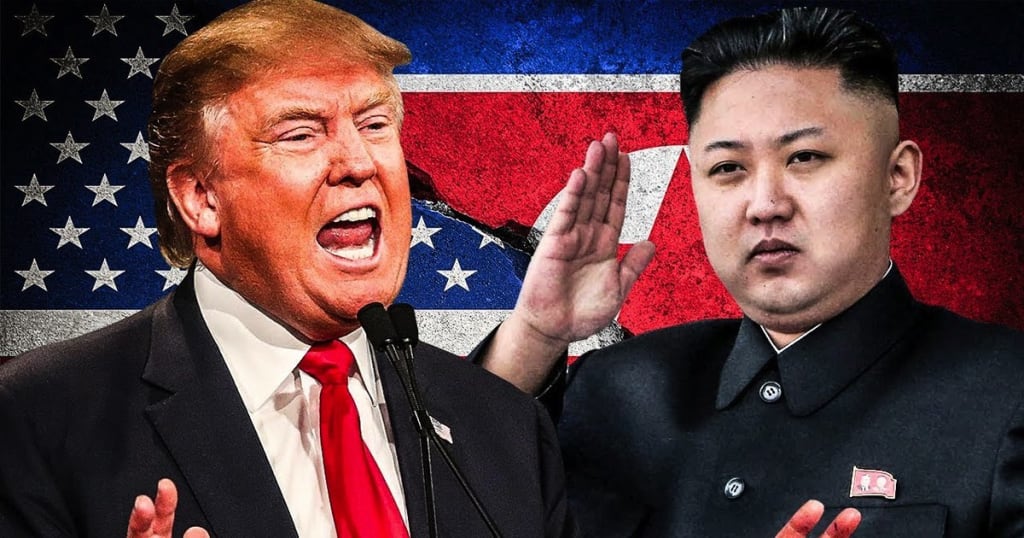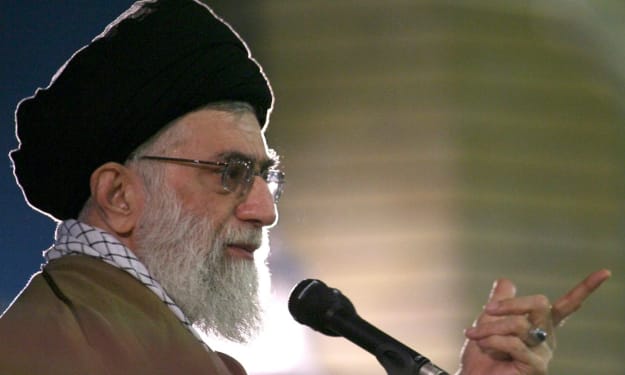Is OIL Behind the Rising Tensions with China, Russia and North Korea?
With the unchecked rise of the Yuan signaling the fall of the petrodollar, it is an entirely necessary question to ask

America's largest export, is its own currency - The nation's economic success is pinned on maintaining international demand for USD
After the end of the second World War, the US Dollar was naturally established as a reserve currency (held in significant quantities by other governments in reserve to their own currency) as the US was the world's leading trading nation, largest exporter and primary creditor.
This has historically afforded the US cheaper international borrowing, and a significant advantage, in excess of $100,000,000 per year, to global trade deals as there has always been a strong demand for US Dollar.
One of the cornerstones for maintaining the Dollar's stature as the globally-dominant currency is the Petrodollar. With the US having historically been the world's largest oil importer, oil sales across the world have traditionally been handled in dollars, hence the crude-oil prices globally being set at $/barrel.
This has been said to benefit all parties for a few reasons. Firstly, America's currency doesn't change. There are mountains of US Dollars hidden away across the world from an under-mattress stash to secretive Swiss bank accounts, that are still legal tender. Secondly, the currency appreciates. A dollar goes up in value, whereas the leading communist/socialist counterparts either don't increase, or are subject to volatile change.
An obvious alternative would be to use a gold-standard currency to trade with, given that it boasts even more stability than the US dollar and an undeniable universality. This has always been strongly opposed by the US, as it would shift the balance of economic power to countries with high gold reserves.
Up until 2010, most central banks across the world were net sellers of gold, decreasing their reserves year on year, until suddenly almost every world super-power shifted and started buying gold.
If we take a look at other global phenomena that preceded this shift in international central-banking practices, you can see some concerning patterns developing;
In 2007 Libya had gold reserves per capita of $13,766.61, being the third highest in the world, closely followed by the UAE at $13,323.34, Qatar at $8,461.91 and Kuwait at $6,567.72. In comparison, the United Kingdom trailed behind in 58th place at $939.55 and with the United States in a staggering 105th place at $234.27. Any shift towards an internationally used Gold-Standard currency would shift power dramatically towards these gold-rich states.
In the build up to the Libyan Civil War, this is exactly what Colonel Gaddafi proposed, initiating talks with Arab nations about reintroducing the ancient standardised currency of the Islamic Gold Dinar, renamed the African Gold Dinar. This was coupled with plans to directly redistribute oil revenue to the Libyan people (Reuters), as any government involvement in the profits could promote corruption.
In 2011 we saw NATO authorise international military pressure on the Libyan decentralised-state and its figurehead following claims of genocide and violation of human rights, stemming from a Benghazi protest around government housing. The situation then escalated rapidly into the public execution of Gaddafi and the toppling of the political system that had undeniably improved the country and the lives of its citizens during its existence. A UN-supported interim administration has been in operation since 2011 and a permanent Libyan Government still seems a way off. During the rebellion and civil-war, the campaign for the African Dinar was abandoned and the PetroDollar's dominance secured.
In the year 2000 Saddam Hussein, incumbent President of Iraq, received UN permission to trade oil in Euros although agreeing to continue pricing in Dollars. The US also commenced construction of Al-Adid, a billion dollar military base in Qatar, within Striking Distance of Iraq in April 2000.
On September 11 2001, America's relationship with Iraq and the Middle East was changed forever. Within 5 hours of the attack on the Pentagon, Secretary of Defence Donald Rumsfield ordered staff to develop plans for a strike on Iraq, 6 days before the attack was linked to Osama Bin Laden, Al-Qaeda and by association, Iraq. There is still little evidence linking Iraq to the 9/11 attacks
President Bush's then counterterrorism director Richard A Clarke recounts the event in his own book "Against All Enemies"
“The president in a very intimidating way left us, me and my staff, with the clear indication that he wanted us to come back with the word there was an Iraqi hand behind 9/11 because they had been planning to do something about Iraq from before the time they came into office. I think they had a plan from day one they wanted to do something about Iraq. While the World Trade Center was still smoldering, while they were still digging bodies out, people in the White House were thinking: ‘Ah! This gives us the opportunity we have been looking for to go after Iraq.'”
By 2002, Saddam Hussein had dumped the dollar, and had fully converted to the PetroEuro.
In January 2003, British Foreign Secretary Jack Straw announced that oil was a key priority to the West’s involvement in Iraq, even more so than the supposed “weapons of mass destruction.”
On March 19 2003, despite previous advice from the then UK Prime Minister Tony Blair to "focus on Al-Qaeda" and to "Leave Iraq for another day", George W Bush announced the initiation of the invasion of Iraq.
In June 2003, at an Asian Security Summit in Singapore, US Deputy Defence Secretary Paul Wolfowitz was asked why Iraq was being treated differently in relation to their nuclear threat than North Korea.
He replied “Let’s look at it simply. The most important difference between North Korea and Iraq is that economically, we just had no choice in Iraq. The country swims on a sea of oil.”
On 10th June, 2003, Iraq offered 10 million barrels of oil for sale to the highest international bidder - The oil was sold in US Dollars.
It's worth bearing in mind that at the time of declaring war on Iraq, the US was nearly bankrupt and to this day stands by the claim that the Iraq war was about protecting Americans against non-existent weapons, and spreading democracy.
Returning to more recent events, In January 2015, Iran announced its departure from the PetroDollar and the shift towards the Russian Rubel and the Chinese Yuan.
In June 2015, John Kerry labelled Iran as the number 1 state sponsor of terrorism in the world, alongside the US' imposition of a variety of sanctions and embargoes on the Iranian government.
In a simultaneous blow to the PetroDollar, Russia's third largest oil producer, Gazprom, announced that they would settle all crude oil sales to China in Yuan, officially ditching the dollar.
With economic and military relations between China and Russia at an all time high, and increasing day-on-day and the US imposing ever increasing sanctions on Moscow, Russia is expected to distance itself from western-controlled institutions and establishments.
As of 2015, the Chinese Yuan had significantly battered the US Dollar:
- China pushed aggressively to have the Yuan added to the International Monetary Fund's SDR Basket of Currencies
- In 2010, against US advice, the Chinese administration announced it would allow it's currency to appreciate in value, making a more attractive currency for other governments to hold in reserve
- China has launched it's own alternative to the IMF and the World Bank with the $100bn New Development Bank
- Beijing has launched the China International Payment System
- China is driving the Silk Road project, constructing rail links between Mainland China, Russia and Europe, further distancing these economies from USD dominance
China is the rising global super-power, rapidly shifting US focus from the middle-east towards Asia.
As the global-economic future starts to look gloomy for the USA, we have seen a significant rise in media coverage and political focus towards North Korea's Nuclear Program. With increased US sanctions imposed on the communist state, their increasing dependence on Chinese and Russian trade is evident
Looking at history, the White House has a track-record of responding to any threat to it's currency's "Reserve" status with strong, swift political and military action.
With the rising threat from China and Russia, it's interesting that we have seen very little threat of military action against either state, with the majority of talks around sanctions. It's equally interesting that suddenly, America's public enemy number one has shifted to a nation nestled between China and US-Supported South Korea.
During the Iraq War, it was obvious why Iraq was supposedly a more significant nuclear threat than N.Korea, as there were strong motivations around Oil, and the security of the Dollar.
Today, these concerns have shifted to the Korean Peninsula, as have America's threats of complete and utter destruction.
About the Creator
Jordan Catto
Late Twenties Lefty Gardener - Writing about the planet, plants and other stuff






Comments
There are no comments for this story
Be the first to respond and start the conversation.